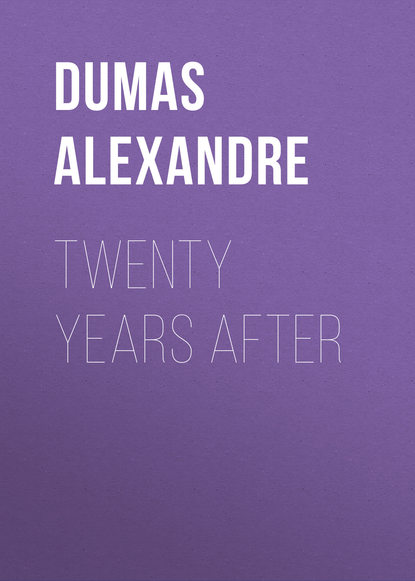По всем вопросам обращайтесь на: info@litportal.ru
(©) 2003-2024.
✖
Twenty Years After
Настройки чтения
Размер шрифта
Высота строк
Поля
Mazarin contemplated these proceedings with a thoughtful glance. They explained what had occurred that evening.
He bowed respectfully to the king, who gave him a somewhat cavalier reception, but a look from his mother reproved him for the hatred which, from his infancy, Louis XIV. had entertained toward Mazarin, and he endeavored to receive the minister’s homage with civility.
Anne of Austria sought to read in Mazarin’s face the occasion of this unexpected visit, since the cardinal usually came to her apartment only after every one had retired.
The minister made a slight sign with his head, whereupon the queen said to Madame Beauvais:
“It is time for the king to go to bed; call Laporte.”
The queen had several times already told her son that he ought to go to bed, and several times Louis had coaxingly insisted on staying where he was; but now he made no reply, but turned pale and bit his lips with anger.
In a few minutes Laporte came into the room. The child went directly to him without kissing his mother.
“Well, Louis,” said Anne, “why do you not kiss me?”
“I thought you were angry with me, madame; you sent me away.”
“I do not send you away, but you have had the small-pox and I am afraid that sitting up late may tire you.”
“You had no fears of my being tired when you ordered me to go to the palace to-day to pass the odious decrees which have raised the people to rebellion.”
“Sire!” interposed Laporte, in order to turn the subject, “to whom does your majesty wish me to give the candle?”
“To any one, Laporte,” the child said; and then added in a loud voice, “to any one except Mancini.”
Now Mancini was a nephew of Mazarin’s and was as much hated by Louis as the cardinal himself, although placed near his person by the minister.
And the king went out of the room without either embracing his mother or even bowing to the cardinal.
“Good,” said Mazarin, “I am glad to see that his majesty has been brought up with a hatred of dissimulation.”
“Why do you say that?” asked the queen, almost timidly.
“Why, it seems to me that the way in which he left us needs no explanation. Besides, his majesty takes no pains to conceal how little affection he has for me. That, however, does not hinder me from being entirely devoted to his service, as I am to that of your majesty.”
“I ask your pardon for him, cardinal,” said the queen; “he is a child, not yet able to understand his obligations to you.”
The cardinal smiled.
“But,” continued the queen, “you have doubtless come for some important purpose. What is it, then?”
Mazarin sank into a chair with the deepest melancholy painted on his countenance.
“It is likely,” he replied, “that we shall soon be obliged to separate, unless you love me well enough to follow me to Italy.”
“Why,” cried the queen; “how is that?”
“Because, as they say in the opera of ‘Thisbe,’ ‘The whole world conspires to break our bonds.’”
“You jest, sir!” answered the queen, endeavoring to assume something of her former dignity.
“Alas! I do not, madame,” rejoined Mazarin. “Mark well what I say. The whole world conspires to break our bonds. Now as you are one of the whole world, I mean to say that you also are deserting me.”
“Cardinal!”
“Heavens! did I not see you the other day smile on the Duke of Orleans? or rather at what he said?”
“And what was he saying?”
“He said this, madame: ‘Mazarin is a stumbling-block. Send him away and all will then be well.’”
“What do you wish me to do?”
“Oh, madame! you are the queen!”
“Queen, forsooth! when I am at the mercy of every scribbler in the Palais Royal who covers waste paper with nonsense, or of every country squire in the kingdom.”
“Nevertheless, you have still the power of banishing from your presence those whom you do not like!”
“That is to say, whom you do not like,” returned the queen.
“I! persons whom I do not like!”
“Yes, indeed. Who sent away Madame de Chevreuse after she had been persecuted twelve years under the last reign?”
“A woman of intrigue, who wanted to keep up against me the spirit of cabal she had raised against M. de Richelieu.”
“Who dismissed Madame de Hautefort, that friend so loyal that she refused the favor of the king that she might remain in mine?”
“A prude, who told you every night, as she undressed you, that it was a sin to love a priest, just as if one were a priest because one happens to be a cardinal.”
“Who ordered Monsieur de Beaufort to be arrested?”
“An incendiary the burden of whose song was his intention to assassinate me.”
“You see, cardinal,” replied the queen, “that your enemies are mine.”
“That is not enough madame, it is necessary that your friends should be also mine.”
“My friends, monsieur?” The queen shook her head. “Alas, I have them no longer!”
“How is it that you have no friends in your prosperity when you had many in adversity?”
“It is because in my prosperity I forgot those old friends, monsieur; because I have acted like Queen Marie de Medicis, who, returning from her first exile, treated with contempt all those who had suffered for her and, being proscribed a second time, died at Cologne abandoned by every one, even by her own son.”
“Well, let us see,” said Mazarin; “isn’t there still time to repair the evil? Search among your friends, your oldest friends.”
“What do you mean, monsieur?”

















